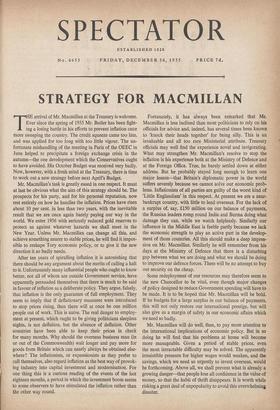STRATEGY FOR MACMILLAN
THE arrival of Mr. Macmillan at the Treasury is welcome. Ever since the spring of 1955 Mr. Butler has been fight- ing a losing battle in his efforts to prevent inflation once more sweeping the country. The credit squeeze came too late, and was applied for too long with too little vigour. The un- fortunate mishandling of the meeting in Paris of the OEEC in June helped to precipitate a foreign exchange crisis in the autumn—the one development which the Conservatives ought to have avoided. His October Budget was received very badly. Now, however, with a fresh mind at the Treasury, there is time to work out a new strategy before next April's Budget.
Mr. Macmillan's task is greatly eased in one respect. It must at last be obvious what the aim of this strategy should be. The prospects for his party, and for his personal reputation, now rest entirely on how he handles the inflation. Prices have risen about 10 per cent. in less than two years, with the inevitable result that we are once again barely paying our way in the world. We enter 1956 with seriously reduced gold reserves to protect us against whatever hazards we shall meet in the New Year. Unless Mr. Macmillan can change all this, and achieve something nearer to stable prices, he will find it impos- sible to reshape Tory economic policy, or to give it the new direction it so badly needs.
After ten years of spiralling inflation it is astonishing that there should be any argument about the merits of calling a halt to it. Unfortunately many influential people who ought to know better, not all of whom are outside Government service, have apparently persuaded themselves that there is much to be said in favour of inflation as a deliberate policy. They argue, falsely, that inflation is the only guarantee of full employment. They seem to imply that if deflationary measures were introduced to stop prices rising, then there will at once be one million people out of work. This is naive. The real danger to employ- ment at present, which ought to be giving politicians sleepless nights, is not deflation, but the absence of deflation. Other countries have been able to keep their prices in check for many months. Why should the overseas business man (in or out of the Commonwealth) wait longer and pay more for goods from Britain which can nearly always be obtained else- where? The inflationists, or expansionists as they prefer to call themselves, also regard inflation as the best way of provok- ing industry into capital investment and modernisation. For one thing this is a curious reading of the events of the last eighteen months, a period in which the investment boom seems to some observers to have stimulated the inflation rather than the other way round. Fortunately, it has always been remarked that Mr. Macmillan is less inclined than most politicians to rely on his officials for advice and, indeed, has several times been known to 'knock their heads together' for being silly. This is an invaluable and all too rare Ministerial attribute. Treasury officials may well find the experience novel and invigorating. What may strengthen Mr. Macmillan's resolve to stop the inflation is his experience both at the Ministry of Defence and at the Foreign Office. True, he barely settled down at either address. But he probably stayed long enough to learn one major lesson—that Britain's diplomatic power in the world suffers severely because we cannot solve our economic prob- lems. Inflationists of all parties are guilty of the worst kind of `Little Englandism' in this respect. At present we are a near- bankrupt country, with little to lend overseas. For the lack of a surplus of, say, £150 million on our balance of payments, the Russian leaders romp round India and Burma doing what damage they can, while we watch helplessly. Similarly our influence in the Middle East is feeble partly because we lack the economic strength to play an active part in the develop- ment of those countries. All this should make a deep impres- sion on Mr. Macmillan. Similarly he will remember from his days at the Ministry of Defence that there is a disturbing gap between what we are doing and what we should be doing to improve our defence forces. There will be no attempt to buy our security on the cheap.
Some redeployment of our resources may therefore seem to the new Chancellor to be vital, even though major changes of policy designed to reduce Government spending will have to be made. It is to be hoped that Mr. Macmillan will be bold. If he budgets for a large surplus in our balance of payments, this will not only restore our international prestige, but will also give us a margin of safety in our economic affairs which we need so badly.
Mr. Macmillan will do well, then, to pay more attention to the international implications of economic policy. But in so doing he will find that his problems at home will become more manageable. Given a period of stable prices, even the most intractable difficulty may be solved. The apparently irresistible pressure for higher wages would weaken, and the savings, which we need so urgently to invest overseas, would be forthcoming. Above all, we shall prevent what is already a growing danger—that people lose all confidence in the value of money, so that the habit of thrift disappears. It is worth while risking a great deal of unpopularity to avoid this overwhelming disaster.


























 Previous page
Previous page